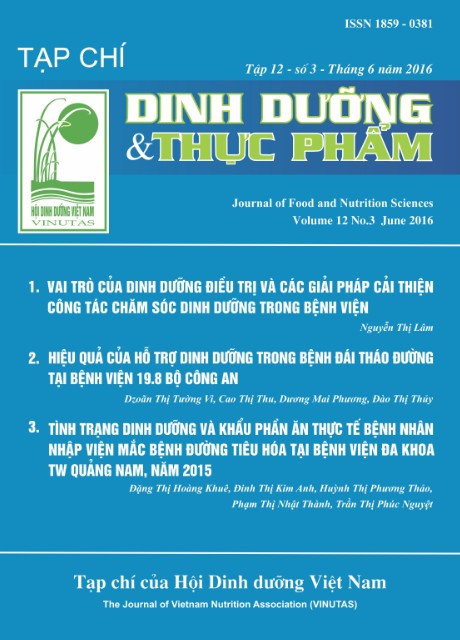EFFECTIVENESS OF NUTRITION SUPPORT FOR DIABETE IN HOSPITAL 19.8
Main Article Content
Abstract
The authors conducted a study on 64 diabetes patients, who were treated at Hospital 19.8. These patients were divided into 2 groups: Group 1 (intervention group) received counseling on nutrition and were given special diet by the Department of Nutrition in 03 weeks. Group 2 (control group) received counseling on nutrition and had their own diet. The results: the rate of patients who well complied on the diet in group 1 (43.8%) was higher than in group 2 (18.8%) with p <0.05; the iance in group 1 (18.8%) was lower than in group 2 (43.8%) with no difference (p> 0.05). Blood biochemical indices in group 1 decreased to close to the normal limits (p <0.05): blood glucose decreased from 12.4
mmol/L to 7.7 mmol / L; cholesterol decreased from 5.6 mmol / L to 5.1mmol / L; Triglycerides decreased from 4.0 mmol / L to 2.9 mmol / L. In Group 2, blood glucose, overall cholesterol, blood triglycerides levels also reduced but the reduction was not statistically significant (p> 0.05).
Keywords
Diabetes, nutritional support, hospital
Article Details
References
2. Saori F. ; Mikuko M.; Onkoo R. et all (2009). Randomized control trial of delivery of diabetic meals as an education tool improved glycemic control in Japanese patients with type 2 diabetes mellitus. Annals of nutrition and metabolism, abstracts 19th International Congress of Nutrition, October 4 – 9, 2009, Bangkok, Thailand, page 195.
3. Berg.A et al (1997). Physical conditioning in the prevention of the Metabolic Syndrome. The Metabolic Syndrome, Gustav Fischer Jena Stuttgart Lübeck Ulm, Freiburg, Page 217.
4. WHO. Diabetes and Noncomunicable diseases, Risk factors Survey. WHO/NCD/NCS/99.1, 1999.
5. KIM M.J., LY S. Y. (2009). Effects of nutrition education on glycemic control in patients with type 2 diabetes mellitus. Annals of nutrition and metabolism, abstracts 19th International Congress of Nutrition, October 4 – 9, 2009, Bangkok, Thailand, page 196.
6. Henry C.J.K., Newens K.J., Lightowler H.J. (2009). Low-glycaemic index sweetener-based beverages reduce 24-h glucose profiles in healthy adults Journal of Human Nutrition and Dietetics, volume 22, issue 1, February 2009, page 77-80.
7. Livesey G., Taylor R., Hulshof T., and Howlett J. (2008). Glycemic response and health – a systematic review and metaanalysis: relation between dietary glycemic properties and health outcomes. American Journal of Clinical Nutrition, January 2008. Volume 87. Number 1(S),258S-268S.
Similar Articles
- Thi Luong DO, Van Giap VU, Duy Tuong PHAM, TÌNH TRẠNG DINH DƯỠNG VÀ KHẨU PHẦN THỰC TẾ Ở BỆNH NHÂN BỆNH PHỔI TẮC NGHẼN MẠN TÍNH GIAI ĐOẠN ỔN ĐỊNH TẠI BỆNH VIỆN BẠCH MAI NĂM 2015-2016 , Vietnam Journal of Nutrition & Food: Vol. 13 No. 4 (2017)
- Thi Diem Tuyet LE, Thi Phuc Nguyet TRAN, Thi Thanh VU, Thi Phuong Thao DINH, NUTRITIONAL STATUS OF PATIENTS WITH CHRONIC OBSTRUCTIVE PULMONARY DISEASE IN BACH MAI HOSPITAL IN 2014 , Vietnam Journal of Nutrition & Food: Vol. 12 No. 3 (2016)
You may also start an advanced similarity search for this article.


